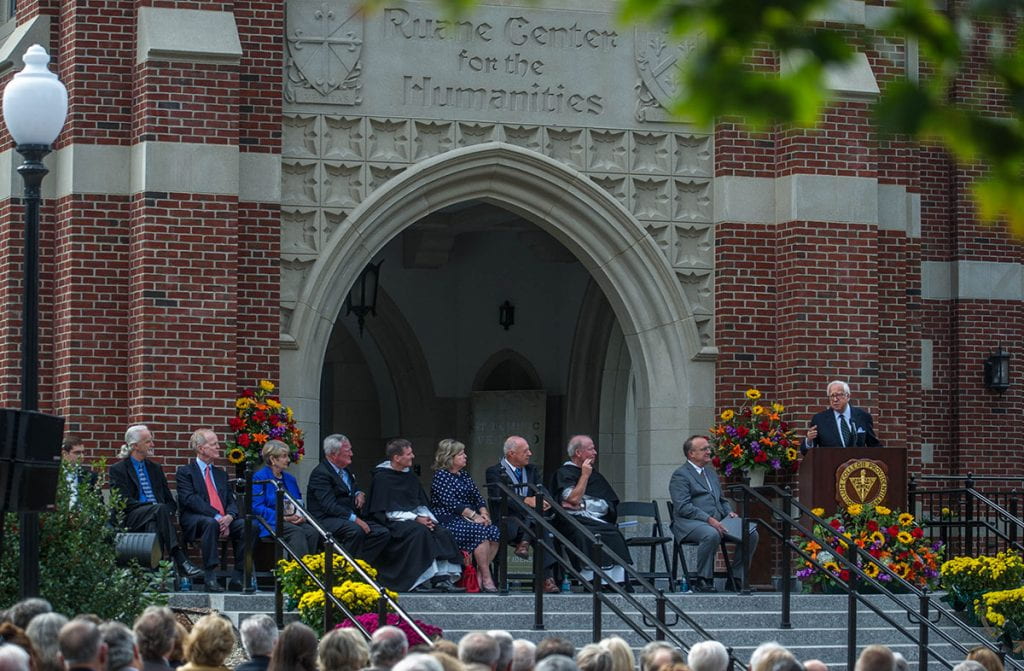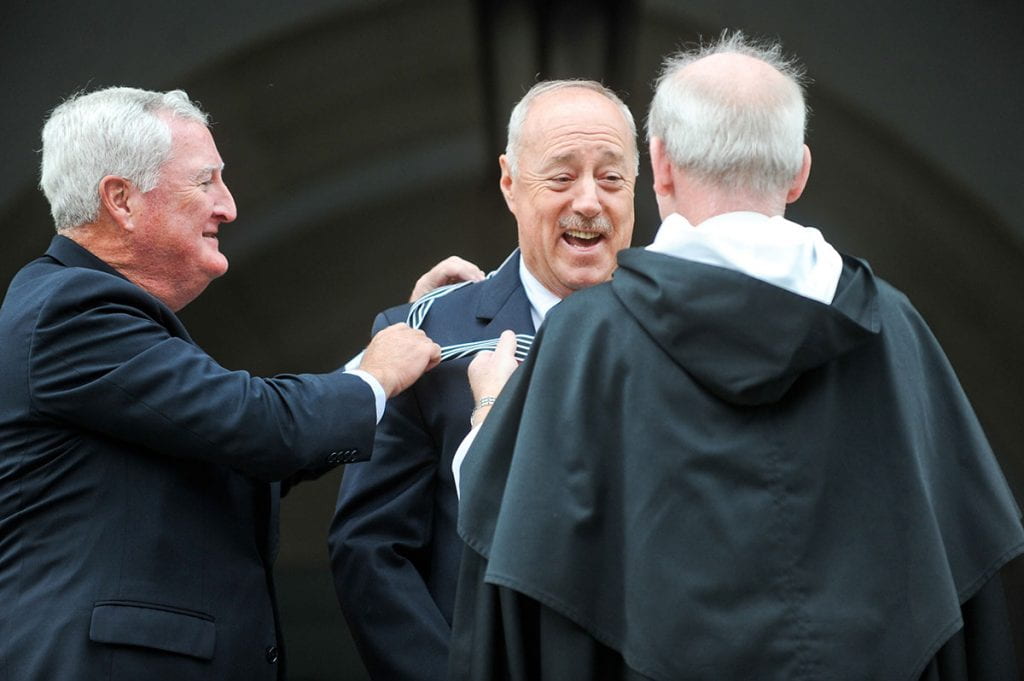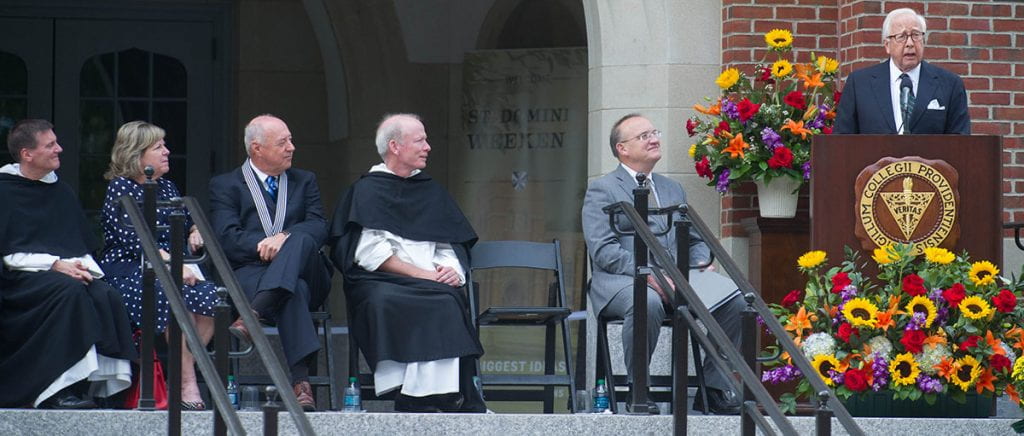A once-in-a-generation opportunity to dedicate a building for the ages
By Vicki-Ann Downing
A once-in-a-generation opportunity to dedicate a building for the ages — the new Ruane Center for the Humanities — was celebrated at Providence College with a speech by one of the greatest historians of the era and with the awarding of a medal and a standing ovation to the donor who made the building possible.
The Ruane Center “is truly a bridge linking our past and our future,” said College President Rev. Brian J. Shanley, O.P. ’80. He spoke under the massive arched entrance of the 63,000-square-foot Ruane Center, which was built to underscore the College’s commitment to the humanities, before 1,200 alumni, students, faculty, and staff on Saturday, October 5, 2013.
The keynote speaker, author and historian David McCullough, affirmed the value of a liberal arts education in an address that drew appreciative applause and laughter.
“I feel to the depths of my being that this emblematic new building is not only a step in the right direction for Providence College, but for our country,” said McCullough. “We need to be reminded about who we are and how we got to be who we are.”

A highlight of the dedication was the awarding of the Veritas Medal — given just 15 times since 1917 in recognition of outstanding devotion to the College — to Michael A. Ruane ’71 & ’13Hon., past chairman of the Board of Trustees. A leadership gift from Ruane and his wife, Elizabeth, made the construction of the center possible.
As Father Shanley and John F. Killian ’77, president of the Board of Trustees, slipped the medal’s blue cord over Ruane’s head, the crowd rose in a standing ovation.
Ruane, who is owner, chairman, and managing partner of TA Associates Realty of Boston, one of the largest real estate investment advisory firms in the country, spoke about buildings. They are built from the inside out, not the outside in, he said, and reflect the goals and mission of the people who have commissioned them and the vision of their occupants.
Buildings are not inanimate objects, he added.
“A building lives and breathes on a daily basis. Its soul, which are its occupants, decide whether it is successful or not,” Ruane said.

The Ruane Center is home to the Development of Western Civilization Program (DWC), Liberal Arts Honors Program, and English and history departments. Its seminar rooms and lecture halls were designed to facilitate the new discussion-style format of the DWC Program, a requirement for all freshmen and sophomores.
Dr. Vance G. Morgan, professor of philosophy and DWC Program director, said a humanities center has been a dream for all of his 19 years at the College, and he finds himself smiling and pinching himself in disbelief as he walks its hallways. Meanwhile, his colleagues have reported the best seminars of their careers.
The purpose of DWC is to make the past relevant to the present, Morgan said.
“The beauty and elegance of the building matches the beauty and elegance of what takes place inside of it,” Morgan added.
Sean P. Aherne ’14 (Cohasset, Mass.), a political science major and president of Student Congress, said he thinks the building, built in the Collegiate Gothic style, resembles a castle from Chaucer’s Canterbury Tales. Other students have likened its two-story, fireplaced Great Room to Hogwarts, the school in the Harry Potter novels, he said.
McCullough’s “career path suggests just how far a liberal arts education can take us,” added Aherne.

McCullough, who was an English major at Yale University, won the Pulitzer Prize for his books John Adams and Truman, the National Book Award for The Path Between the Seas and Mornings on Horseback, and the Presidential Medal of Freedom, the nation’s highest civilian honor.
“History is human. History is about people,” said McCullough.
It shouldn’t be about memorizing quotations or dates, he said, because, in the words of one of his professors, “You can look that stuff up in books.”
“History is … to be taught as an inexhaustible storehouse of ideas,” McCullough said. “History is about ideas and medicine and music and science and money and love, and should be taught that way. There is no excuse for anybody making history boring.”
By learning about the people of the past, reading what they read and even the mail they received and wrote, we come to understand them and why they acted as they did, McCullough said.
We realize that “these people we think are so extraordinary didn’t just happen to be that way” because “there is no such thing as a self-made man or woman. We are all the result of parents, teachers, friends, rivals, and people we never knew, couldn’t know — they lived in another time. They wrote the books that inform us, the poetry that moves us,” McCullough said.
He discussed the book he is researching about the Wright brothers, who never went to college, but whose father, an itinerant preacher, kept a house full of books by Hawthorne, Melville, Virgil, Plutarch, and Twain, and insisted his sons read all of them.
“He wanted them to have an open mind, pursue the truth, catch the lifelong love of learning,” McCullough said.
Father Shanley said the address “exceeded our expectations,” adding that it was a pleasure to hear the voice of McCullough, the host of public television shows.
“I don’t know what God is going to sound like when we finally get there but it’s either James Earl Jones or David McCullough,” Father Shanley said.
The Ruane Center, which opened in September, was built in 18 months by Dimeo Corp., which also constructed Phillips Memorial Library. The center’s architects included two men who once sat in DWC classrooms: Daniel S. Kantor ’92, principal and chief financial officer of S/L/A/M Collaborative, and Gerald J. Sullivan ’86, a principal in Sullivan Buckingham Architects.
The dedication took place during St. Dominic Weekend, an annual event that honors the College’s most generous benefactors. They include Edward L. Scanlon ’55 & ’00Hon., a former PC trustee, and his wife, Andree, who were recognized at the dedication for their generosity to the center. Its first-floor lecture hall is named for Scanlon.





